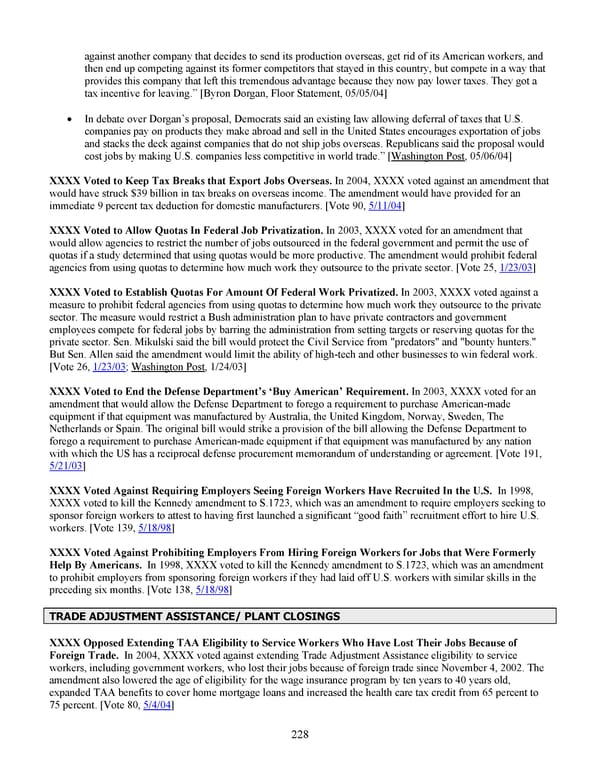against another company that decides to send its production overseas, get rid of its American workers, and then end up competing against its former competitors that stayed in this country, but compete in a way that provides this company that left this tremendous advantage because they now pay lower taxes. They got a tax incentive for leaving.” [Byron Dorgan, Floor Statement, 05/05/04] In debate over Dorgan’s proposal, Democrats said an existing law allowing deferral of taxes that U.S. companies pay on products they make abroad and sell in the United States encourages exportation of jobs and stacks the deck against companies that do not ship jobs overseas. Republicans said the proposal would cost jobs by making U.S. companies less competitive in world trade.” [Washington Post, 05/06/04] XXXX Voted to Keep Tax Breaks that Export Jobs Overseas. In 2004, XXXX voted against an amendment that would have struck $39 billion in tax breaks on overseas income. The amendment would have provided for an immediate 9 percent tax deduction for domestic manufacturers. [Vote 90, 5/11/04] XXXX Voted to Allow Quotas In Federal Job Privatization. In 2003, XXXX voted for an amendment that would allow agencies to restrict the number of jobs outsourced in the federal government and permit the use of quotas if a study determined that using quotas would be more productive. The amendment would prohibit federal agencies from using quotas to determine how much work they outsource to the private sector. [Vote 25, 1/23/03] XXXX Voted to Establish Quotas For Amount Of Federal Work Privatized. In 2003, XXXX voted against a measure to prohibit federal agencies from using quotas to determine how much work they outsource to the private sector. The measure would restrict a Bush administration plan to have private contractors and government employees compete for federal jobs by barring the administration from setting targets or reserving quotas for the private sector. Sen. Mikulski said the bill would protect the Civil Service from "predators" and "bounty hunters." But Sen. Allen said the amendment would limit the ability of high-tech and other businesses to win federal work. [Vote 26, 1/23/03; Washington Post, 1/24/03] XXXX Voted to End the Defense Department’s ‘Buy American’ Requirement. In 2003, XXXX voted for an amendment that would allow the Defense Department to forego a requirement to purchase American-made equipment if that equipment was manufactured by Australia, the United Kingdom, Norway, Sweden, The Netherlands or Spain. The original bill would strike a provision of the bill allowing the Defense Department to forego a requirement to purchase American-made equipment if that equipment was manufactured by any nation with which the US has a reciprocal defense procurement memorandum of understanding or agreement. [Vote 191, 5/21/03] XXXX Voted Against Requiring Employers Seeing Foreign Workers Have Recruited In the U.S. In 1998, XXXX voted to kill the Kennedy amendment to S.1723, which was an amendment to require employers seeking to sponsor foreign workers to attest to having first launched a significant “good faith” recruitment effort to hire U.S. workers. [Vote 139, 5/18/98] XXXX Voted Against Prohibiting Employers From Hiring Foreign Workers for Jobs that Were Formerly Help By Americans. In 1998, XXXX voted to kill the Kennedy amendment to S.1723, which was an amendment to prohibit employers from sponsoring foreign workers if they had laid off U.S. workers with similar skills in the preceding six months. [Vote 138, 5/18/98] TRADE ADJUSTMENT ASSISTANCE/ PLANT CLOSINGS XXXX Opposed Extending TAA Eligibility to Service Workers Who Have Lost Their Jobs Because of Foreign Trade. In 2004, XXXX voted against extending Trade Adjustment Assistance eligibility to service workers, including government workers, who lost their jobs because of foreign trade since November 4, 2002. The amendment also lowered the age of eligibility for the wage insurance program by ten years to 40 years old, expanded TAA benefits to cover home mortgage loans and increased the health care tax credit from 65 percent to 75 percent. [Vote 80, 5/4/04] 228
 HRC vote skeleton Page 245 Page 247
HRC vote skeleton Page 245 Page 247